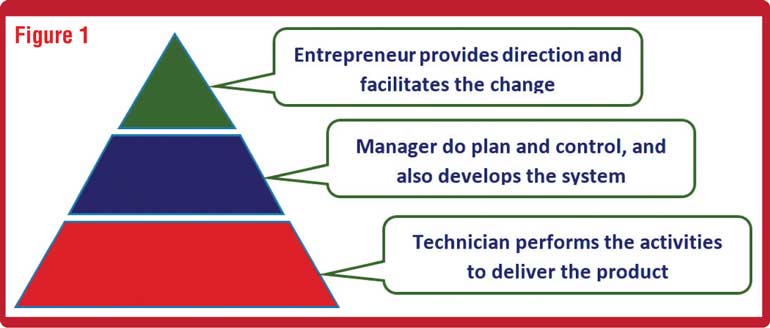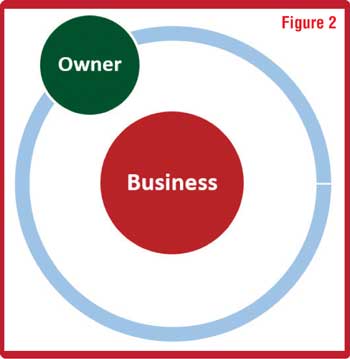Friday Dec 12, 2025
Friday Dec 12, 2025
Tuesday, 22 August 2023 00:46 - - {{hitsCtrl.values.hits}}
 When digging into the causes of failure, it’s a shocking discovery that the first enemy of such failed
When digging into the causes of failure, it’s a shocking discovery that the first enemy of such failed
startups, most of the time, has been the owner of such endeavours him/herself
In any typical startup, most of the time the objective of the owner is to establish the business and become independent from day-to-day management of the business. Hence, the business owner has to keep transforming himself and the business to ultimately become the pure entrepreneur to drive the change compared to the startup stage, whilst reviewing and guiding the business. At a stage where business occupies a dominating position in the market, the owner would be out of this pyramid and would be a satellite around the pyramid to guide the business and facilitate the change. It doesn’t mean that the owner is totally detached from the business but there will be teams taking care of the strategic functions in the pyramid
 The fundamental truth behind all successful startups has always been a well-conceived entrepreneurial idea and a groundbreaking business model providing the business shape to the idea which results in solving the target problem. For every startup to become a successful business, first, the product market fit is to be achieved to discover the customer and business model and then establish the right system capable of scaling up.
The fundamental truth behind all successful startups has always been a well-conceived entrepreneurial idea and a groundbreaking business model providing the business shape to the idea which results in solving the target problem. For every startup to become a successful business, first, the product market fit is to be achieved to discover the customer and business model and then establish the right system capable of scaling up.
Unfortunately, more than 90% of startups fail due to wrong decisions within three to five years since the inception. In the beginning, the startups need to gain the right traction in the market by finding product market fit, discovering the business model, and also establishing the right system to replicate the discovered business model to increase revenue. When digging into the causes of failure, it’s a shocking discovery that the first enemy of such failed startups, most of the time, has been the owner of such endeavours him/herself. This article explores how such an unfortunate situation could be unfolded.
At any stage of a business including the startup stage, a business demands three types of decisions: entrepreneurial, control-driven, and operational. In other words, the startups must be nimble to identify opportunities, develop the system to formulate the offer, and execute so as to fully seize the opportunity. Hence, particularly, at the startup stage the owner is supposed to play the roles of three simultaneous personalities; Entrepreneur, Manager, and Technician. Since the startup is the stage where an untested hypothesis is validated to discover the right business model, the owner would have to play all three roles in a balanced manner. This demands the owner to be a catalyst for the business to scale up and finally, make the business independent from the owner.
Entrepreneurship basically refers to trying to solve a problem with an innovative solution. The entrepreneur is the personality that focuses on the future and always “what-if” questions drive creativity and innovation. This role is all about facilitating and driving change. The key catalysts of entrepreneurship are vision, dream, energy, imagination, and strategic thinking. Hence the entrepreneur is the personality that brings product, process, and business model innovation to business. If the original idea doesn’t work, it needs to be reiterated or even pivoted. Then entrepreneurs strive toward exploration and change.
Once the entrepreneur personality discovers the customer and business model, the manager personality has to formulate the strategy, develop the plans, put things in order, and control towards desired results. This personality primarily focuses on identifying activities what to do and what not to do. This personality is primarily responsible for making sure the discovered business model is repeated to generate more revenue and optimise the profit generated by the business. The important competencies built in business by this personality are repeatability and predictability. The manager strives towards exploitation and order. The manager’s priority is making a system and making it work in order.

The third crucial personality a startup expects from the owner is the technician. The focus of technicians is on doing things. This personality is interested in the methods of doing things, driven by the question of how to do it. The technician’s approach is more present, i.e. trying to complete what is supposed to be at the moment than thinking long term. The technician is more like a soldier on the battlefield as a soldier’s job is to fight the immediate encounter rather than thinking about the management and entrepreneurial aspects. Similarly, the technician is also focused on serving the current customer rather than thinking about growth, profitability, achieving the plan, changes in business model and strategy, etc.
Ideally the entrepreneur, manager and technician must live within the startup owner to become a competent person and deliver the respective performance a balanced manner. The entrepreneur must set the vision and drive the change, manager must be focusing on creating a system and executing the plan, and technician must perform the activities to finally to deliver the product or the service to the customer, i.e. delivers the promise, as the majority of startups consists of only person or a few. Figure 1 illustrates where each type of personality lives in a startup.
In any typical startup most of the time the objective of the owner is to establish the business and become independent from day-to-day management of the business. Hence, the business owner has to keep transforming himself and the business to ultimately become the pure entrepreneur to drive the change compared to the startup stage, whilst reviewing and guiding the business. At a stage where business occupies a dominating position in the market, the owner would be out of this pyramid and would be a satellite around the pyramid to guide the business and facilitate the change. It doesn’t mean that the owner is totally detached from the business but there will be teams taking care of the strategic functions in the pyramid.
Figure. 2
 At the time of startup itself, the owner must be determined to make the business independently run with a sound system, at the market dominant stage. The owner gradually becomes the catalyst of change for keeping the business continuously relevant and performing. Ideally, at the dominant stage, the owner’s role would resemble the role of a satellite. Figure 2 illustrates the ultimate role of the owner to land up.
At the time of startup itself, the owner must be determined to make the business independently run with a sound system, at the market dominant stage. The owner gradually becomes the catalyst of change for keeping the business continuously relevant and performing. Ideally, at the dominant stage, the owner’s role would resemble the role of a satellite. Figure 2 illustrates the ultimate role of the owner to land up.
The main purpose behind most startups is either to be independent by having their own business or desire to project oneself as a business owner. For every startup to reach the said state it has to cross four stages; startup, growth, scale-up, and market dominance. Taking the role of the owner at the stage of start up the owner would work as a technician, manager, and entrepreneur. When a business needs to move to the growth stage the owner needs a good team to grow the business. Hence, the role of the owner needs to be changed to a team leader. At the scale-up stage, the businesses grow multiple times by stretching the strengths of built capabilities right throughout. This stage needs the owner to be leader of the leaders of multiple teams. Finally, at the dominant stage, the owner has to facilitate leaders to lead the teams and move in the right direction by driving the agenda for growth and change. Hence, this clearly shows right from startup till the fourth stage the owner needs to change the roles to facilitate the journey of business across these four stages. Every owner has to understand that a startup is a temporary organisation that strives to discover a repeatable and scalable business model. Hence, strategic change, management and control, and operation and execution all should happen at the right pace. However, most start-up owners lose this balance once the business is started due to the challenges at the startup stage. One of the big challenges at this stage is generating sufficient cash flows to cover the expenses. This pressure pushes the owner to focus mostly on the technician role to focus only on the operation, even extended hours a day, to generate the target revenue. Hence, the owner finds very little or no time to focus on other roles.
In the case of most startups, the owners fail to develop the right team at the startup stage itself. Equipping the business with an efficient team is an important prerequisite to move to the next stage. The transformation of the role along with the growth of the business across these stages requires the owners to develop themselves to suit the roles at each stage. This becomes only possible when the right balance is maintained between the three personalities at the startup stage. When every startup seriously harnesses the four key levers of any business success called an effective strategy, team, execution, and cash generation, that makes owners transform themselves the way the business demands and also take the businesses across the four stages.
To achieve the expected evolution in the role of business owners and make the business independent from owners, the best idea is to treat the business as a product. It means, when a business is set up as a product at any point this could be separated from owners without capital losses and even replicated since the business is equipped with the right system and boundaries.
The main risk of the paralysed approach of the owners at this stage leads the owner himself to become the bottleneck or the constraint for the business growth. At the startup stage owner and the business are the same not separable. The owner has to stretch himself to satisfy as many customers as possible, as with most startups generating enough cash to meet the bills becomes a top priority, which leads to defects and other problems with the businesses.
Here the technician becomes the business owner and the focus on growth becomes upside down since the technician will have only an operational view. This leads the business to get stuck at one point. For a business to move to the next stage the strategic view needed which could be provided by only entrepreneurial role.
In conclusion, when the owners fail to maintain a balance between entrepreneurial, managerial and technical demands and are paralysed towards the technician role, the business loses the sight of future and fails to prepare itself for the next stage, at startup stage. This is how the owner becomes the enemy of a startup.
(The writer is an Associated Chartered Management Accountant (ACMA), Chartered Global Management Accountant (CGMA) and a Certified Internal Auditor (CIA). He has a MBA from London Metropolitan University, UK and a B.Sc. Management Special (Public Administration) from the University of Sri Jayewardenepura, Sri Lanka. He could be reached via [email protected].)